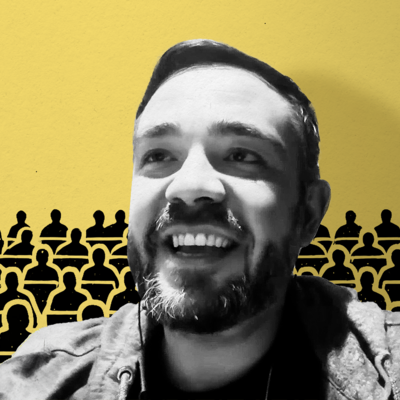
TL;DR: Today we’re releasing a new episode of our podcast How Do You Use ChatGPT? I go in depth with David Perell, a writer, investor, and educator behind the popular online writing class Write of Passage. Watch on X or YouTube, or listen on Spotify or Apple Podcasts.
A lot has been said about prompting artificial intelligence into churning out something magical. David Perell, however, uses ChatGPT to prompt himself.
David is one of the best known internet writers of his generation. He’s amassed almost a half million followers on X, hosts the popular How I Write podcast, and founded Write of Passage, which has taught thousands of students how to write on the internet.
Under the warm lights of a studio in Williamsburg, I sat down with David for the first-ever live recording of this podcast. It was a deep conversation that shows the diverse powers of ChatGPT for thinking, reading, writing, and decision-making.
We used it to do deep textual analysis of our favorite books, unpack business strategy questions, understand David’s personality and leadership style—and even co-write an article live with ChatGPT as our sparring partner.
I came away from this conversation feeling deeply moved; it was one of the most inspiring episodes we’ve ever done. Here’s a taste:
- Articulating hidden truths. We feed a list of David’s heroes (which he conveniently had handy, by the way) into ChatGPT and ask it to synthesize the core overlaps among them. ChatGPT comes up with something that David had never articulated before: His heroes exemplify a balance of joyfulness and seriousness. “What GPT can do is it can give you clarity and put words to things that you just had a hazy intuition around,” he says.
- On-demand motivational interviews. Like most of us, David struggles with staying authentic to his beliefs in the face of what others think: “There’s the truth that I know and I’m worried about expressing that truth…because I’m worried about how it’s going to make me look.” We ask ChatGPT to interview David live on the show to help him make sense of this internal paradox. Through the questions it asks, we uncover some deep insights along the way, including into the relationship David and I share.
- Finding ideal collaborators. When you’re working with people who complement your personality type, magical things can happen. So we use ChatGPT to help David discover who he worked best with. His guess before we started was enneagram types five and eight. It admittedly takes some prodding, but ChatGPT eventually comes up with the same answer, validating David’s intuitive conclusion: “Did I call it or did I call it… that is pretty cool, right? That is intuitively what I picked up on!”
- Office hours with ChatGPT. We workshop the New York Times’s business model with ChatGPT to demonstrate the importance of getting really specific with prompts. When we input: “Tell me about the biggest risks in the business over the next 10 years,” ChatGPT spews out “buzzword bingo.” But when we niche down, asking it to focus on how the Times can shift from advertising to subscription revenue through the lens of three famous strategists, it does really well. “[N]ow we can start having a conversation amongst those three people to see where the Mount Rushmore of business strategists agree and…disagree,” David says.
- Obviating the internet’s biggest flaw. David’s biggest gripe with the internet is that it's pulling us into a never-ending now: “[I]f you look at the way the internet is designed…you open up our social media feeds and basically everything was created in the last 24 to 48 hours.” For David, true wisdom lies in things that have stood the test of time, which ChatGPT can help us unearth: “You can literally, in your custom instruction, say, I don't want anything before 1970.”
- Understanding stories. When David was in middle school, he got tutored in reading comprehension, getting extra help to read books: “I would have to interpret paragraphs…I just couldn't do it.” He says that he still struggles to understand stories sometimes. With ChatGPT, David asks for the views of different experts on the text he’s reading: “Going from [a] kid who can't do it to [a] tech-enabled adult who can do it actually better than even some of the best people in the world at looking at stories is…huge.”
- Reading old books. David uses ChatGPT to translate a verse from the Bible’s Book of Acts in three different styles, discovering that the Greek word “archegos” can mean both “author” and “prince.” Sharing his “conflicting desires” as both an entrepreneur and a writer, David says: “[F]or me and my work running Write of Passage, I can now make an argument for writing that is rooted in this Greek word…all these things that I thought were totally different are actually one and the same…GPT is really useful because I can see the different translations, look at the discrepancies, and get my answer.”
- Surfacing anecdotes that spread. David has mastered the art of the anecdote (read the first paragraph of any of his essays and you’ll see what I mean). We decide to write a piece about New Yorkers who have good taste live on the show. In pursuit of a great anecdote for the introduction, David asks ChatGPT to list beautiful buildings in New York. The Woolworth Building, the first one on the list, sparks his memory—and changes the direction of the piece. “I just had an anecdote that showed up in the very first example [of ChatGPT’s output], and we're going to change what it is that we're writing about,” he says.
- Writing from conversation. It comes as no surprise that David sources ideas for his writing through conversations with friends, families, and acquaintances. Now, he uses ChatGPT as well: “Until the development of this technology, you could only do that with another human being…now you can do that with an extremely smart computer.”
You can check out the episode on X, Spotify, Apple Podcasts, or YouTube. Links and timestamps are below:
- Watch on X
- Watch on YouTube
- Listen on Spotify (make sure to follow to help us rank!)
- Listen on Apple Podcasts
Timestamps:
- Intro 00:53
- Finding and understanding his heroes 13:42
- Understanding his personality and leadership style 19:14
- Who does David work well with? 25:53
- Workshopping the New York Times’s business strategy 36:52
- Why ChatGPT is incredible at diversity, accessibility, and speed 52:54
- Bringing old books like Moby Dick to life with DALL-E 58:50
- Using ChatGPT for deep textual analysis 1:06:29
- ChatGPT for writing anecdotes that spread 1:21:04
- Conversations with ChatGPT as food and drink for the soul 1:25:55
What do you use ChatGPT for? Have you found any interesting or surprising use cases? We want to hear from you—and we might even interview you. Reply here to talk to me!
Miss an episode? Catch up on my recent conversations with software researcher Geoffrey Lit, Waymark founder Nathan Labenz, Notion engineer Linus Lee, writer Nat Eliason, and Gumroad CEO Sahil Lavingia, and learn how they use ChatGPT.
My take on this show and the episode transcript is below for paying subscribers.
The Only Subscription
You Need to
Stay at the
Edge of AI
The essential toolkit for those shaping the future
"This might be the best value you
can get from an AI subscription."
- Jay S.
Join 100,000+ leaders, builders, and innovators

Email address
Already have an account? Sign in
What is included in a subscription?
Daily insights from AI pioneers + early access to powerful AI tools






.31.48_AM.png)


